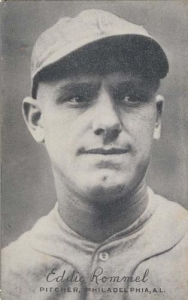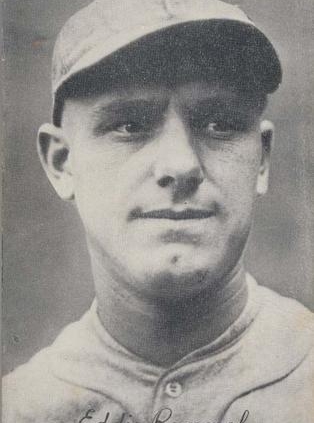September 15, 1931: Philadelphia A’s clinch American League pennant without fanfare
 The Philadelphia Athletics had a veritable lock on first place. A win today, Tuesday, September 15, would produce their 99th victory of the season, a goal reached only five times before in franchise history. The second-place Washington Senators were mathematically still in the hunt. An A’s win coupled with a Senators loss would seal the pennant for the Philadelphians, their third in a row. They would tie with the New York Yankees for the American League record. John McGraw had won four straight (1921-24) with the National League New York Giants.
The Philadelphia Athletics had a veritable lock on first place. A win today, Tuesday, September 15, would produce their 99th victory of the season, a goal reached only five times before in franchise history. The second-place Washington Senators were mathematically still in the hunt. An A’s win coupled with a Senators loss would seal the pennant for the Philadelphians, their third in a row. They would tie with the New York Yankees for the American League record. John McGraw had won four straight (1921-24) with the National League New York Giants.
By dint of his seemingly insurmountable lead, owner-manager Connie Mack, widely known as Mr. Mack, had already begun shuffling his juggernaut lineup to give his regulars some rest and his backup players some experience and/ or preparedness for the World Series. Stars Jimmie Foxx, Mickey Cochrane, Max Bishop, Bing Miller, and Mule Haas all enjoyed a well-deserved rest for the day. In spite of the A’s star-studded lineup, the Yankees still dominated the AL statistically in most offensive categories. It was the A’s formidable mound corps that gave them their margin over the vaunted New Yorkers.
The opponents for the day were the fourth-place Cleveland Indians, who had only one pennant in team history. They won in 1920 under the leadership of their player-manager, peerless Tris Speaker, commonly known as the Grey Eagle for his prowess in covering center-field territory.
Philadelphia had been beset for several days with an unseasonal heat wave. At 85 degrees, this day constituted a modest break in the swelter.1 A relatively sparse crowd, as few as 1,500, filed into venerable Shibe Park.2 The game was the 10th of a 19-game homestand. It was also the third game of a four-game final series with the Indians. The day before, the two opponents had split a doubleheader.
Mack bestowed the honor of pitching the potential pennant-winning game on veteran Eddie Rommel, an illustrious veteran who had toiled for only the Athletics in his 12-year career. He had pitched two innings in relief the previous day. In his prime he had led the American League in wins twice, with 27 in 1922 and 21 in 1925. He was right-handed and the first major-league hurler to master and employ the knuckleball. His 27 victories in 1922 remain as of 2022 the major-league record for knuckleballers.
Rommel’s receiver for the day was a 28-year-old rookie named Joe Palmisano, whose entire career consisted of 19 games in the current season. He was replacing starter Mickey Cochrane, who was slated to be interviewed by the legendary Grantland Rice on the radio at 9:30 P.M.
Mel Harder, a 21-year-old hurler, was the starter on the mound for the Indians. In spite of his youth, Harder was a mainstay in the Cleveland pitching rotation. His batterymate was Luke Sewell, an 11-year veteran, who was the backbone of the Cleveland catching corps.
Eric McNair, a utility infielder, replaced Max Bishop at second base and in his usual leadoff spot in the lineup. Bishop was arguably the best leadoff man in the major leagues.3 The outfield was shuffled to give Mule Haas and Bing Miller some rest. League-leading batter Al “Bucketfoot” Simmons was shifted from his normal post in left-field to center. Twenty-year-old rookie Lou Finney, making only his second start, was installed in left field. Jimmy Moore took over right-field duties. At first base replacing Jimmie Foxx was Phil Todt, who had been claimed from the Red Sox on waivers in February.
The first inning set the tone for the day. Odell Hale led off for the Indians with a triple to right field. Bruce Connatser popped out to shortstop. Dick Porter flied out to Finney in short left field. The rookie threw out Hale at the plate, snuffing out the early scoring opportunity.
In the bottom half of the inning, McNair led off with a ground single to the shortstop, Ed Montague. Finney singled. Montague made a throwing error that allowed McNair to score and Finney to take third. Jimmy Moore doubled to left to drive in Finney. Simmons grounded out to short, allowing Moore to advance to third. Phil Todt singled to drive in Moore, ending the A’s scoring. Jimmy Dykes grounded to second and Todt was out on a fielder’s choice. Dib Williams singled to right field and Dykes stopped at second. Palmisano grounded to the shortstop, who threw out Williams for the force, stranding two runners.
In the top of the second, Earl Averill, leading off, hit a homer, his 30th, to deep right, breaking the ice for the Indians and reducing the margin to two runs.
In the bottom of the second, the A’s canceled out the Indians’ run and added a second to the margin. Both runs were unearned because of a second throwing error by Montague.
The Indians failed to score in their half of the third. The A’s added two more runs on the strength of a two-out triple by Finney. It spelled the end of Harder’s day’s work. He was relieved by Oral Hildebrand, who retired the final A’s batter on a fly ball to left field. In 2⅔ innings Harder yielded 10 hits and seven runs, of which two were unearned, walked one, struck out one and hit one batsman.
The game proceeded in much the same vein for its duration. When the smoke finally cleared, the A’s second string had outscored the Indians 14-3. Rommel, 6-5, threw a complete game, yielding nine hits, including one home run, two triples, and one double. He and his defense stranded six Indians runners. Cleveland had 17 total bases but managed only three runs. The A’s had 21 total bases and produced 14 runs with the help of three Cleveland errors. The loss dropped Harder’s record to 13-13. Time of the game: 1:44.
The Philadelphia offensive output was truly a team effort. Everyone got into the act. The entire lineup, including Rommel, hit safely and produced at least one RBI. Only Rommel failed to score. Dib Williams had five singles in five at-bats. Perhaps the treat for the A’s fans was the play of rookie Lou Finney in his second start. In five plate appearances and four at-bats he collected three hits, a triple and two singles, drove in two runs and was hit by a pitched ball. In the outfield he was errorless, made seven putouts and had the only outfield assist of the day.
The Philadelphians had beaten the Indians for the 17th time in the season while losing four to them. The crowd left the ballpark with little fervor or fanfare. There was no celebration.4 The scoreboard indicated Washington was leading the St. Louis Browns in the fourth inning. Besides, ultimately winning the pennant was a foregone conclusion. There was no need for excitement.
Shibe Park was empty an hour after the game. At 6:15 P.M. news arrived that the St. Louis Browns had turned the tables on the Senators and won in the bottom of the ninth.5 The entire country soon knew the Mackmen had won the American League pennant. Mr. Mack had beaten his own record by taking his ninth AL flag. By the end of the regular season the Senators stumbled along the way and were overtaken by the Yankees for second place, 13½ games behind the Athletics.
The A’s, who had won the 1930 World Series from the Cardinals in six games, had a rematch with St. Louis in the 1931 fall classic. Their opponents enjoyed sweet revenge in a seven-game Series. It was the high-water mark for the Athletics. They would never win another pennant in the City of Brotherly Love.
SOURCES
In addition to the sources cited in the Notes, the author consulted Baseball-Reference.com, Retrosheet.org, Baseball-Almanac.com and the following:
“‘Fine,’ Mildly Enthuses Connie, Hoping That Ninth Flag Will Not Be Macks’ Last,” Philadelphia Inquirer, September 16, 1931.
NOTES
1 “Yesterday’s Local Weather Report” and “Cooler Weather Due; Showers Promised” Philadelphia inquirer, September 16,1931: 1, 2.
2 “Macks Annex Pennant Again, Upset Indians,” San Bernardino County (California) Sun, September 16, 1931: 14.
3 Bill Nowlin, “Max Bishop,” SABR Biography Project, sabr.org/bioproj/person/ab12ea82.
4 “Philadelphia Accepts Feat Without Cheering,” Lansing (Michigan) State Journal, September 16, 1931: 13.
5 James Isaminger, “A’s Take Third Pennant and Equal League Record,” Philadelphia Inquirer, September 16, 1931: 1.
Additional Stats
Philadelphia Athletics 14
Cleveland Indians 3
Shibe Park
Philadelphia, PA
Box Score + PBP:
Corrections? Additions?
If you can help us improve this game story, contact us.


